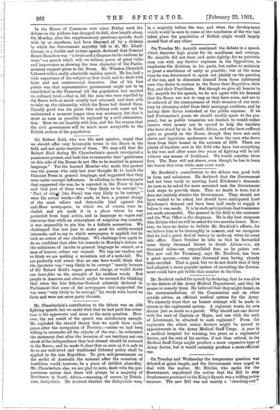Mr. Chamberlain's contribution to the debate was an able fighting
speech, but we could wish that he had paid less atten- tion to his opponents and more to the main question. How- ever, the, net result of the speech was satisfactory enough. He exploded the absurd theory that we could have made peace after the occupation of Pretoria,—unless we had been willing to surrender all the objects of the war; he reiterated the statement that after the invasion of our territory not one shred of the independence they had abused should be restored to the Boors; and he made it clear that as soon as it is safe to do so our well-tried and traditional Colonial policy shall he applied to the late Republics. To give self-government on the model of Australia the moment after the cessation of hostilities would, however, be a piece of childish absurdity. Mr. Chamberlain also, we are glad to note, dealt with the pre- posterous notion that there will always be a majority of Dutchmen in South Africa,—meaning, of course, by Dutch- men, disloyalists. He doubted whether the disloyalists were in a majority before the war, and when the develop meat which would be sure to come at the conclusion of the war had taken place the population of British origin would largely exceed that of any other.






































 Previous page
Previous page